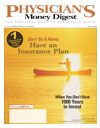Don't Allow Luck to Determine Your Decisions
Fooled by Randomness: The Hidden Role of
Chance in Life and in the Markets
When it comes to investing, the differencebetween luck and knowledge can oftenbe blurred, especially when the markettakes an unexpected turn for the better. NassimNicholas Taleb, trader, academic, and author of(Random HousePublishing Group; 2005), says that randomness andluck are bigger factors in markets than many peoplerealize. Unfortunately, there is a price to be paid forthis tendency. When fooled by randomness, mostpeople become overly confident and take unintelligentrisks, select poor investments or advisors, andultimately suffer avoidable losses as a result.
One of the most common examples of beingfooled by randomness is investors who chase short-termpast performance investments. While such astrategy can work, most investors will eventuallyfail with this approach over an extended period oftime. Some suffer immediate losses; others surviveand even thrive until they too, in time, self-destruct.
Those who lose quickly may be the luckierones. Their losses usually represent a small part oftheir total capital. When important investing decisionsare made by finding significance in relativelymeaningless fluctuations, it is only a matter oftime before losses mount. This is why WarrenBuffett has observed that, "The dumbest reasonto buy [an investment] is because it is going up." And selling something merely because the price isfalling is also unwise. Nevertheless, this is exactlywhat most people tend to do—even those whoshould know better.
Fooled
by Randomness
Since this unproductive pattern seems to ensnareso many otherwise intelligent and successful people,its causes must be deep rooted. Indeed, offers the following three reasonswhy investors are prone to this vice:
•A tendency to extrapolate short-term successinto the future (ie, seeing patterns where there arenone and thinking that recent past is prologue).
•Obliviousness to obvious data biases that leadsto reliance on "bad" data without critical scrutiny.
•An unwillingness to recognize or govern thesetendencies—it is unpleasant to turn a critical eyetoward yourself.
Randomness and chance are continuously atwork in the markets and can ensnare both professionalsand amateurs. So whether you manage yourown investments or rely on an advisor, you need toscrutinize your process and avoid these traps.Unfortunately, most people keep repeating thesemistakes. Even as one group of investors sufferslosses, they are replaced by a fresh supply of otherconfident victims ready to repeat their follies.
The prevalence of randomness raises a practicaldilemma for investors seeking to evaluate theiralternatives—whether it is their own skills orthose of their advisors. Knowledge is a good start.Now that you know about the pitfalls, you canwork to minimize your chances of becoming avictim—or at least a repeat victim. It is importantto find and stick to a sound process. Smartinvestors focus on fundamentals like value investing,and they stick to their process over the longterm, ignoring the arbitrary fluctuations theyencounter on their way to investment success.
Kaushal B. Majmudar, CFA, is president of the Ridgewood Group,a Short Hills, NJ-based money management firm focusing onintelligent investing that is rated 5-Stars, their highest rating, bythe Paladin Registry. Founded by Mr. Majmudar and Ms. AhalyaNava, a Harvard Business School graduate, the Ridgewood Grouphelps clients around the country manage their wealth more intelligently. Theywelcome questions or comments at 973-544-6970 or info@ridgewoodgrp.com.For more information, visit www.ridgewoodgrp.com.
